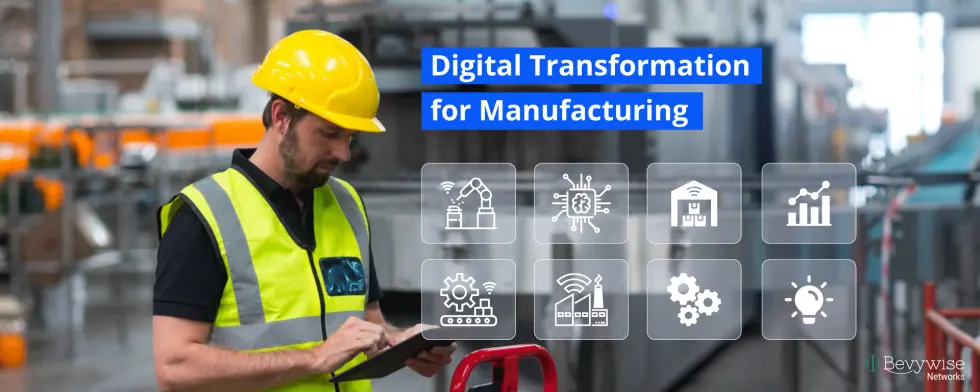Digital Transformation for Manufacturing – Challenges & Solutions
by Saravana Kumar

Manufacturing Industry has a major key role in the economic growth and development of countries. Historically, it has been the heart of all developed and developing nations. Also, the economic growth of the country relies only on the increase in productivity growth. Manufacturing Industry plays a key role in the success of the socio-economic system, because of its close relationship with economic welfare and hence it has a major impact on national growth also. But it has been facing huge difficulties and challenges. The internal Manufacturing ecosystems will not be a systemic & proper intellectual system which largely creates a negative impact on industrial productivity. This is because some shifts yield better output with a high productivity rate and some with an average productivity rate and the final overall visibility will be irregular resulting in lack of productivity. Hence, the goal of productivity increase & economic growth is fully dependent on a new chapter called Digital Transformation. Let us have a deeper look on digital transformation in manufacturing industry.
What is digital transformation?
Digital transformation has been the trending term frequently known as the adoption of digital technology to transform services (or) business by replacing non-digital or manual processes with digital processes. It is a journey of strategic planning, organizational change and it starts empowering manufacturing teams with new methods to create a highly responsive productive environment.
Industrial Revolutions
Industrial revolution refers to the simple change and transition in the manufacturing industry. Till now, it has made a 4 master changes and it will continue to trigger next level of growth in the manufacturing industry.
The First Revolution was the transition of new manufacturing processes which begins in Europe and the United states, during the period of 760 to sometime between 80 and 840.The transition involves moving from hand production methods to machines.
The Second Industrial Revolution was a rapid standardization and the industrialization period which occurs in the late 19th century. This Industrial revolution waves largely impacts the build out of railroads and steel production. The new arrival of electrical steel, boosts mass production.
The Third revolution begins during the period of 1970. It revolutionized the use of electronics and IT into further automation and production. Outcomes of Industry 3.0 introduced a more automated system into the assembly line to easily perform human tasks.
The Fourth Industrial revolution is the new decade of manufacturing industry. It is the recent trend of automation and data exchange in manufacturing technologies. The goal is to enable autonomous decision-making processes & monitor assets and processes in real time.
Industry 4.0 & Digital Transformation
Digitization impacts all the systems of the global world and also on the recent forms of society. There are some distinct ways in which digitization becomes effective which is the Digital transformation and presentation of information. It is not just about technology, it is about re-imagining business.
The global economy relies on the growth of the manufacturing industry and the recent trend totally changes the minds of customers demanding more customized products. The digital world could provide so many valuable solutions to meet the demands of customers. With the help of digital transformation in manufacturing, the entire industry will be under the control of our hands. Moreover, digitization provides so many benefits like paperless environment, easy & instant communication, Proper Production Planning, Downtime and Machine idle time reporting, with an improvement in productivity and profit, enhanced data collection and quality of products.
Why is it needed?
In the Hyper competitive Business world, adopting and adapting is a more important one. The increase in competition in the field of manufacturing Industry puts more pressure on organizations to reduce costs, improve customer experience and increase profitability.
The manual process of collecting data and logging it in documents or spreadsheet is an unreliable & long one. Calculating Machine idle , Availability Loss, Performance Loss manually will not be accurate and also manual calculation of overall equipment efficiency will not be fair at all time. This is where digital transformation comes in providing more accurate & reliable measurements. A disconnected industry without digitization is nothing but just an island of data. There will not be any flow between start to end. Every department that is shop floor, Management, sales etc will remain isolated and there won’t be any possibility of exchange of information because there is no connectivity between them. With the digital transformation in manufacturing industry, it is easy to build a connectivity within industry. So that, everything from data acquisition to reporting will be simple & clear. Every emerging industry needs valuable solutions to their problems and most importantly they want it fast. The digital transformation can achieve it providing a good customer experience.
Top 5 functional areas that need digital transformation
Inventory Management
Observing your customer’s needs and making wise decisions on how to manage them though inventory is a challenge in today’s buying environment. Even with the availability of technology many companies still have outdated inventory management systems and manual processes.The demands of customers are constantly changing and now they are expecting distributors to be more flexible with their orders. If there is a limited visibility in inventory management, there won’t be any proper traceability.
Hence they need automated inventory management with real-time status to streamline work operations.
Quality Management
In the business competitive world, product quality is very important to create a brand in the market. Bad quality reflects sales and marketing, consumer relationship & finally will damage your brand value. Defective product will cause rework costs, refunding cost, Lost sales etc.
Hence, a complete production monitoring & management solutions can solve the basic quality issues by avoiding the production of rejects.
Production time and Downtime reporting
Industry expects the best productivity with lower downtime & proper utilization. These are key functional units for the production environment. If you manually measure Production time and downtime reporting it will be unreliable and will cause a tedious problem. This is where production monitoring comes in providing a complete report on downtime. This enables you to act proactively on the occurrence of downtime.
Traceability
Entire Manufacturing Industry has many departments and various shifts. Hence, the overall workflow and process disconnect will not be clear. However, digital transformation in manufacturing helps in providing overall visibility much easier with the support of mobile applications and various software applications to access and view visibility remotely.
Customer relationship management
Customer relationship management refers to maintaining and creating good relationships with customers. It is not only about business it is also about creating a strong personal bonding with the people. This will definitely lead to a new value creations. If the customer is satisfied they will remain in business forever resulting in an increase in customers. Without digital transformation maintaining customer relationship will be a difficult process.
Top 5 Challenges in implementing Digital Transformation
Feasibility Study
The challenges, industries have been facing should be observed & understood well. Analysing what actually the problem is & what can be the solution is a major one. This is because most of the times, the problems faced and the solutions provided will be a contrast to each other. So the implementation of digitization will become more difficult.
Skilled Labour
Human Resource availability is a major challenge in the manufacturing industry. Skilled Labour shortage have a big impact as it stresses them to complete a job in a short span of time. Due to overtime work, low salary & no growth there is a possibility of quitting the job by Labours.
So as a result, the manufacturing industry will struggle for productivity.
Struggles to adapt
The major challenge is that many industries are not ready to adapt to it. However, the only way to adapt to a constantly changing and rapidly disrupted present is to speed up and operate at pace.
Limited Budgets
Small Scale to Medium-sized manufacturing industry facing financial reasons to adapt a digital transformation. Many manufacturers will hesitate to adapt to digitization thinking as it could cost them an arm & leg. But the thing is digital transformation will simplify work process & resource utilization, improving productivity & ROI.
Employees are ready to implement
It is human nature, that the routines will always make us feel comfortable and we will seem to be grim when our routines are changed and the uncertainty enters our lives. Experiencing a digital transformation is the epitome of discomfort. So it may make employees feel threatened. Hence, changes in employee mindset are major challenges.
Benefits of Digital Transformation
Improved Profitability
The arrival of digital transformation boosts the measurement of work, performance & availability metrics. This provides the data on overall equipment efficiency helping manufacturers to take decisions on improving overall efficiency. If the efficiency improves there will be a definite improvement in the profit.
Improved Customer satisfaction
Advanced level of technology and its growth increases customer satisfaction. Even for the demand of customization, digital transformation can help implement it fast & satisfy customer expectations.
More Reliable
Reading data manually from machines is unreliable. IoT provides M2M communication enabling automotive data acquisition which improve reliability and accuracy.
Improved Productivity
Machine and Operator performance can be evaluated. With proper software along with tools and process that work together can streamline workflow and improve productivity. By automating many manual tasks and integrating data throughout the organization, team members will get empowered to work more efficiently.
How can we help ?
The numerous solutions & software’s are available in market to succeed in Industry 4.0 race. Bevywise is one of the best solution provider as it totally optimizes the shop floor, & Connects entire factory, establishing an end to end data visibility and overall traceability providing a fully paper free environment along with Quality Control and Management, Proper production planning, WIP tracking/traceability, Valuable Reporting.
Conclusion
Smart Manufacturing Execution System will Optimize your shop-floor to maximize profits. It provides the best solution to identify Loopholes or Low performing departments with a complete view of the production. Organisation can work proactively & look ahead to make long term decisions and think smart.
To know more….Talk to our experts to discuss about your requirements at your shop floor to improve your manufacturing productivity.
